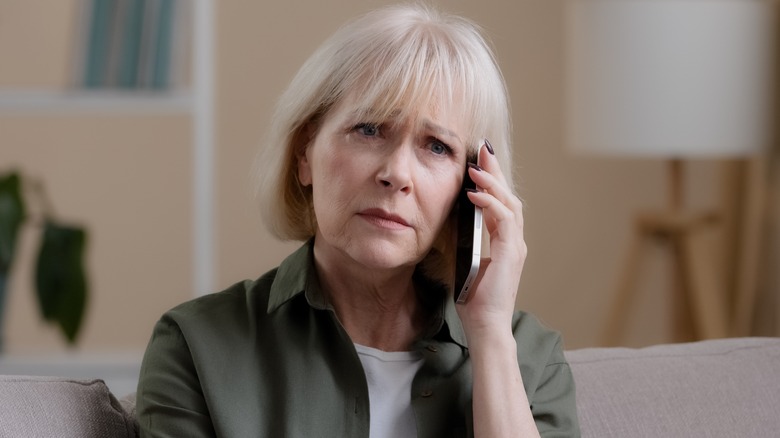6 Conversation Starters To Safely Open Up About Your Mental Health
It can be hard opening up about mental health with those closest to you, and there are many reasons why this is the case. Sometimes, there is shame and stigma around mental health, making people reluctant to talk about it. Things can be a little hazy when it comes to articulating what's going on with your thoughts and emotions. So, speaking out loud about it to someone else can seem daunting. You might also feel like you're upsetting those close to you if you disclose what you're experiencing. There can be a whole host of reasons. But the truth is, sharing honestly with those in our circle can be a healthy, wise decision. Friendships are a key component of mental health. Your tribe can help you navigate issues and give you trusted listeners to confide in.
Friends and family may not be qualified mental health professionals, but it's still important that you keep them in the loop about your mental health. Communication is key here. Let them know you're just looking for someone to talk to. Or perhaps you know that they've struggled with something in the past and want to know how they coped. If you need professional help, a friend may know a good therapist you could benefit from seeing. Letting a close person know how they can help can be good for both parties. You can get the support you need and they know they're helping a friend. Here are some tips for getting these conversations started in an effective way.
'Can I share about something going on with me?'
It's important to note that you don't have to tell every friend about your mental health. In fact, that can be overwhelming, so it's best to choose a few close, trusted confidants to speak with. Part of the benefit of disclosing this, once you've chosen the people you feel safe with, is that they'll have a peek into where you are mentally. If you aren't as keen to hang out, are slower to respond to them, or are less animated when you're around them, they'll understand. You're giving them the information to cut you a little slack during a tough time.
It's important to ask those close to you if you can talk about your mental health. Leading with a question like, "Can I talk about what's going on with me?" gives them the chance to pause and consider if they're able to listen effectively. Maybe they're feeling overwhelmed and can't handle unexpected news at the moment. If they can't hear you, it's okay. You took a chance to open up and you should respect their choice to decline. Also, beginning with clear communication that the topic is about you tells them that they're not in the hot seat. Saying something more general like, "Can we talk?" often makes people assume they did something wrong. Letting them know it's not about them gives them the information from the get-go that they're being approached only as a confidant.
Describe what's changed in your life
One way to ease into a conversation about our mental health is to start a discussion about recent life changes. The changes could include difficulty sleeping, a drop in productivity at work, a change in appetite, or other behavioral changes. Telling your loved ones, "I've been struggling with this. and I just want to share it with you" can give them insight into recent changes.
If it's challenging to open up about recent changes directly, one tip is to use movies, TV, and books to articulate what's going on. In a 2021 study published in the National Library of Medicine, researchers spoke about the success of cinematherapy and bibliotherapy. Patients got the opportunity to explore and talk about their struggles through the characters they watched or read about. It also offered the benefit of distance from their personal issues. While the studies primarily discussed this as forms of therapeutic care, using film and book references can be a helpful way to discuss your mental health with loved ones. There's the buffer of distance as you can talk about what a familiar character went through, therefore keeping the focus off of yourself as you introduce the issue. And if family and friends haven't seen the film, you can suggest they watch it to gain more insight.
'Something has flared up again. Can I talk to you about it?'
If something's come up before and your close circle already has some context for it, this can be a helpful way to let them know what's going on. "Hey friend, remember when I hit a wall last year? It's happening again," gives those close to you a historical reference for what's going on. "I haven't been feeling like myself again," can be another helpful way to let them know what's going on even when you aren't totally sure how to articulate it. If a mental health issue has come up previously in your life, there can be a barrier of shame about addressing it again. "Nearly all of my clients have struggled with shame about having a mental illness, or even about having feelings that are inconvenient or that seem out of sync with what others seem to feel," therapist Lea Seigen Shinraku told Psych Central. But the key to overcoming this shame is a sense of togetherness.
One thing that is key is to explain why you're opening up to them specifically. You can let your confidants know how much you've appreciated their help in the past and stress how their continued support strengthens the relationship in the long run. Letting them know what worked can also be a great way to show them exactly what you need.
The power of texting
Sometimes when we're going through it, sitting face to face with someone to open up about our mental health can be too daunting. A safe method of communication, as opposed to isolating, is texting. A simple text saying, "Hey, I'm struggling with this right now. Just wanted to let someone know," can keep friends in the loop. If you need more, just ask. "Can we go for a walk later?" can open the door. Of course, text tone can sometimes be tough to read, so it helps to give friends context. An isolated text that says, "Can we talk?" might stress friends out. Let them know that it's in regard to our own mental health so the texts won't be misconstrued.
Another plus about texting is that it gives friends a heads-up, and they have the time and space to process the news you've given them. They may need time to research the issue. Maybe they need to process the news, and texting won't put them on the spot. If there's more to say than what a text can hold, voice notes can be another really useful way of communicating while having the power of the pause between responses.
Plan the conversation ahead of time
In preparing to speak to your friends and loved ones about your mental health, it can be particularly helpful to plan what you want to say before you see them or text them. This can take some of the pressure off the conversation since you won't be putting yourself on the spot. One trick is to write out the key points you want to address ahead of time. This way, you are less likely to miss anything or overshare if you're not ready to disclose everything. A physical list of topics can also be helpful. Perhaps you're struggling with feeling adequate at work, or you're not feeling like yourself after dealing with a hardship like the loss of a friend. Having these as a reference on your notes app can help you keep the conversation focused and can give your friend a better picture of what you're going through.
Part of planning a mental health conversation with your loved ones also means deciding where you want to have the conversation. Do you want to invite them into your home, or would a public location provide a more neutral space? Would a park or a natural setting feel more peaceful? Would the conversation be better over the phone? Choosing how and when you speak to those close to you can be an empowering gesture because you're taking the steps to make sure you can safely and comfortably let in those dear to you.
Accept help when given, when it feels right
One of the biggest challenges for many people is asking for help and accepting it when it's offered. Often, you might not want to bother people or put anyone out, or you may want to appear independent and self-sufficient, but this isn't always helpful. Dr. Xuan Zhao told Self that it's very common to struggle with this when, in reality, people genuinely want to help others. Dr. Zhao urged people to try accepting help, just to see how earnest people are in their desire to take care of others. "When you accept support, you can see how genuinely people are willing to help you," Dr. Zhao said. "This might make you rethink your hesitancy to reach out to others."
To successfully ask for help, Dr. Zhao suggested trying the SMART acronym, involving requests that are specific, meaningful, action-oriented, realistic, and time-bound. Even if what we need is emotional support, it can be helpful to be concrete and clear. That way, the person we're asking understands our needs. So as much as it may be tempting to resist assistance, it's actually a positive thing for everyone. You can also flip the script and imagine how much you'd be there for your loved ones if they reached out for help. Let that be your guiding compass. People love being needed. We can let them be there for us.
If you or anyone you know is having suicidal thoughts, please call the National Suicide Prevention Lifeline by dialing 988 or by calling 1-800-273-TALK (8255).






